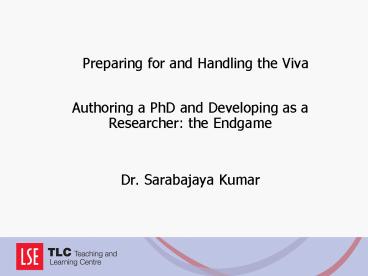Preparing for and Handling the Viva - PowerPoint PPT Presentation
1 / 20
Title:
Preparing for and Handling the Viva
Description:
Preparing for and Handling the Viva Authoring a PhD and Developing as a Researcher: the Endgame Dr. Sarabajaya Kumar Today s Workshop Aims To give you an ... – PowerPoint PPT presentation
Number of Views:190
Avg rating:3.0/5.0
Title: Preparing for and Handling the Viva
1
Preparing for and Handling the Viva
- Authoring a PhD and Developing as a Researcher
the Endgame - Dr. Sarabajaya Kumar
2
Todays Workshop Aims
- To give you an overview of the viva process
- To give you the opportunity and space to think
through the process - Overall
- To de-mystify what may seem like a mysterious
process
3
Agenda
11.00 Coffee 11.05 Exercise 11.20 Preparing
for the viva purpose, process.
11.45 Examiners and Examinees Panel - Q
A 12.25 Summary and reflections
4
Fears and Needs Brainstorming
- Working in your table groups, take a few minutes
to - brainstorm your fears about the viva process and
- what you would like to get out of this workshop.
- Write down the groups ideas on the flipchart.
5
The PhD Viva Purpose(s)
- Checking its all your own work
- Check you fully understand the work and its
implications - Independent professional examination/voice
- Examiners use viva to clarify points of
uncertainty - Candidates can use the viva to seek advice on
progressing the research further - Rite of passage - acceptance into the Academy
6
The PhD Viva Process
- Selecting your examiners
- When? Minimum 6-8 weeks before submission
- You will be contacted about setting a time, date
and place by your supervisor
7
The PhD Viva Process (contd.)
- Examiners each prepare a preliminary report
before the viva - In the room 2 examiners, you, possibly your lead
supervisor (unless you decide otherwise) - Take with you a copy of your thesis, any
preparation notes, something to take notes with
8
The PhD Viva Process (contd.)
- Outcomes
- Pass with no corrections/amendments (considered
unusual) - Pass with minor corrections/amendments (most
common) - Referral (18 months to do major
corrections/amendments) - Offered award of MPhil
- Fail
- Examiners will prepare a joint report, which you
will see
9
Recent PhD Exam Outcomes
- According to Research Degrees Unit, 207 PhDs
awarded between 2012 to 2013 - 98 PhDs awarded with no amendments
- 90 PhDs awarded with minor amendments
- 19 PhDs awarded after major revisions
- 3 MPhils awarded
- 0 Fails
10
The PhD Viva Preparation
- Before you submit examiner selection, produce a
good industrial standard thesis, rolling
synopsis - After you submit
- Re-read and SUMMARISE (chapters and thesis as a
whole) - Mark-up thesis highlights
- Make a list of typos/errors there will be some!
- Revise some of the key works/ideas you made use
of - Practice anticipate likely questions and
practice answering them
11
What will I be asked?
- Not the Spanish Inquisition!
12
Common Viva Questions
- Originality
- What are the most original parts of the thesis?
- Which propositions would you say are
distinctively your own? - How do you think your work takes forward or
develops the literature in this field? - What are the bottom line conclusions of your
research? How innovative or distinctive are they?
13
Common Viva Questions
- Origins/Topics
- Can you tell us how you came to choose this topic
for your doctorate? - Why have you defined the topic in the way you
did? - What were some of the difficulties you
encountered and did they influence how the topic
was framed?
14
Common Viva Questions
- Methods
- What are the core methods used in this thesis?
Why did you choose this approach? In an ideal
world, are there different techniques youd have
liked to use? - Data
- What are the main sources or kinds of evidence?
Are they strong enough to sustain the conclusions
you draw? - How do your findings fit with or contradict the
rest of the literature in this field?
15
Common Viva Questions
- What next?
- What are the main implications of your research
for the rest of the field?
16
The Panel
The Examiner/Supervisor/Deans Perspective Dr.
Sunil Kumar Dean of Graduate Studies and
Department of Social Policy The PhD Graduates
Perspective Dr. Evi Boukli (Law), Dr. Jonathan
Roberts (Social Policy) and Dr. Melissa
Fernandez (Sociology)
17
Dealing with Questions
- Listen to the question
- Pause - take your time
- Talk precisely and move from the general to the
specific - Use appropriate rhetorical strategies
- First person and the active voice
- Speaking in the past tense
18
Dealing with Criticisms
- Define-defend (Murray)
- Viva Debate/Assume Disagreement and Conflict
- Defend but not Defensive
- Define - say what you did then Defend say why
you did it Shifts tone and creates space to
demonstrate knowledge and process. - Examiner Why did you not do a more detailed
analysis of ? - Defensive Stance I did not do that because
- Define/Defend What I did was my reasons for
doing this were I could have done a more
detailed analysis of by but I decided not to
because
19
Dealing with Criticisms
- Defence in depth (Dunleavy)
- Keep the faith, but respect and accommodate
examiners criticisms/suggestions - Keep in mind the (limited) scope of a PhD thesis
- Talk about making amendments in the context of
publication
20
What Next ?
- Further reading
- P. Dunleavy, Authoring a PhD (Basingstoke, 2003)
Chapter 8 - R. Murray, How to survive your Viva (Maidenhead,
2003)































